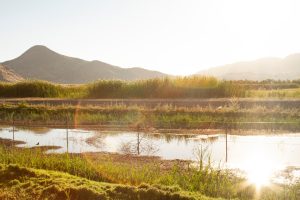
Shrinking Groundwater Causes Disputes
Disclaimer: This article does not constitute legal advice. If you have any questions about your individual situation, seek the advice of an experienced legal professional.
An alarming 2023 New York Times investigation has revealed that the US is draining its groundwater supplies. Water supplies cannot keep up with human demand, especially under accelerating climate change conditions.
Case Study: Eastern Idaho Dispute
Drought in the West has become a National issue, to the extent that a US Senate panel has been convened to address the problem. As drought tightens water supply, groundwater users and surface water users often find themselves in conflict as a result of climate change related water shortages.
Due to dwindling water supply, a conflict broke out between surface water users and ground-water users in Idaho who had previously agreed to reduce usage of water that feeds the reservoir.
In a 2015 agreement, Eastern Idaho groundwater users and surface water users agreed to reduce water usage. Since then, groundwater users have been accused of breaking this agreement and depleting groundwater. The Surface Water Coalition in Magic Valley disagreed with the Idaho Ground Water Appropriators in Eastern Idaho over water distribution in the Eastern Snake Plain Aquifer. The groundwater users were threatened with water curtailment but protested that it would threaten their ability to pursue agricultural operations.
Why Does Groundwater Use Cause Conflict?
Heavy Agricultural Use Causes Conflict with Other Users
Agriculture is the biggest user of water in the US. Agriculture, industry and households compete for water under pressure of climate change related droughts.
Water Rights are Complex
In the West, water rights are extremely complex, so when conflict breaks out between water users, it can be tricky to resolve. Groundwater rights and surface water rights have different rules and legal underpinnings. It is difficult for parties to come to an agreement that benefits everyone while relying on historical rules for water use that may no longer reflect the current reality of water supply and demand.
Water Users Depend on Each Other
Even if users have different legal rights, their fates are intertwined. Surface water is subject to evaporation because of drought, so surface water users rely more on responsible use of groundwater. Instead of cooperating to help each other, parties end up in conflict.
Water Rights Mediation Promotes Responsible Water Use
Getting everyone to agree on balanced and equitable water use is a complex process. It requires knowledge of Western Water Rights law and the complexities of water supply and demand. This analysis must also be flexible to allow for climate change conditions. It also has to consider different legal and bureaucratic frameworks.
For example, Idaho has spent $500 million on a program to replenish the Eastern Snake Plain Aquifer to recycle floodwaters back into the aquifer. The success of the program relies on the cooperation of other water users. Unfortunately, the Interior Department’s Bureau of Land Management asserts that federal law does not allow them to share water with the state. Different layers of government and legal standpoints may also obstruct cooperation over water supplies.
Replenishing groundwater supplies on a national level will take large scale cooperation among parties with different interests, legal rights and at different levels of government. Water rights mediation is a process that avoids litigation and instead focuses on cooperation and constructive planning for the future. It is a high level mediation strategy that is grounded in science, law and innovative theories of conflict resolution.
At Boileau Conflict Resolution we work with parties nationally and internationally who are seeking to resolve water conflicts. These disputes may involve issues with ground-water, surface water, water rights, water pollution, water scarcity, conservation, climate change and more. We thoroughly analyze the potentials for resolution using proven conflict resolution tools and our knowledge of the law, environmental science, climate change science and water rights. We assist parties to create long-lasting agreements that have positive impacts for all. Negotiating over precious natural resources requires a high level of attention to detail, flexibility and careful planning for an uncertain future in which water may be scarce. Our high level water rights mediation team works with parties nationally and internationally, both remotely and in person. We have offices in San Diego, CA, Bozeman, MT and Michigan. Contact us to learn more about water rights mediation.
